SUMMARY
This is AI generated summarization, which may have errors. For context, always refer to the full article.
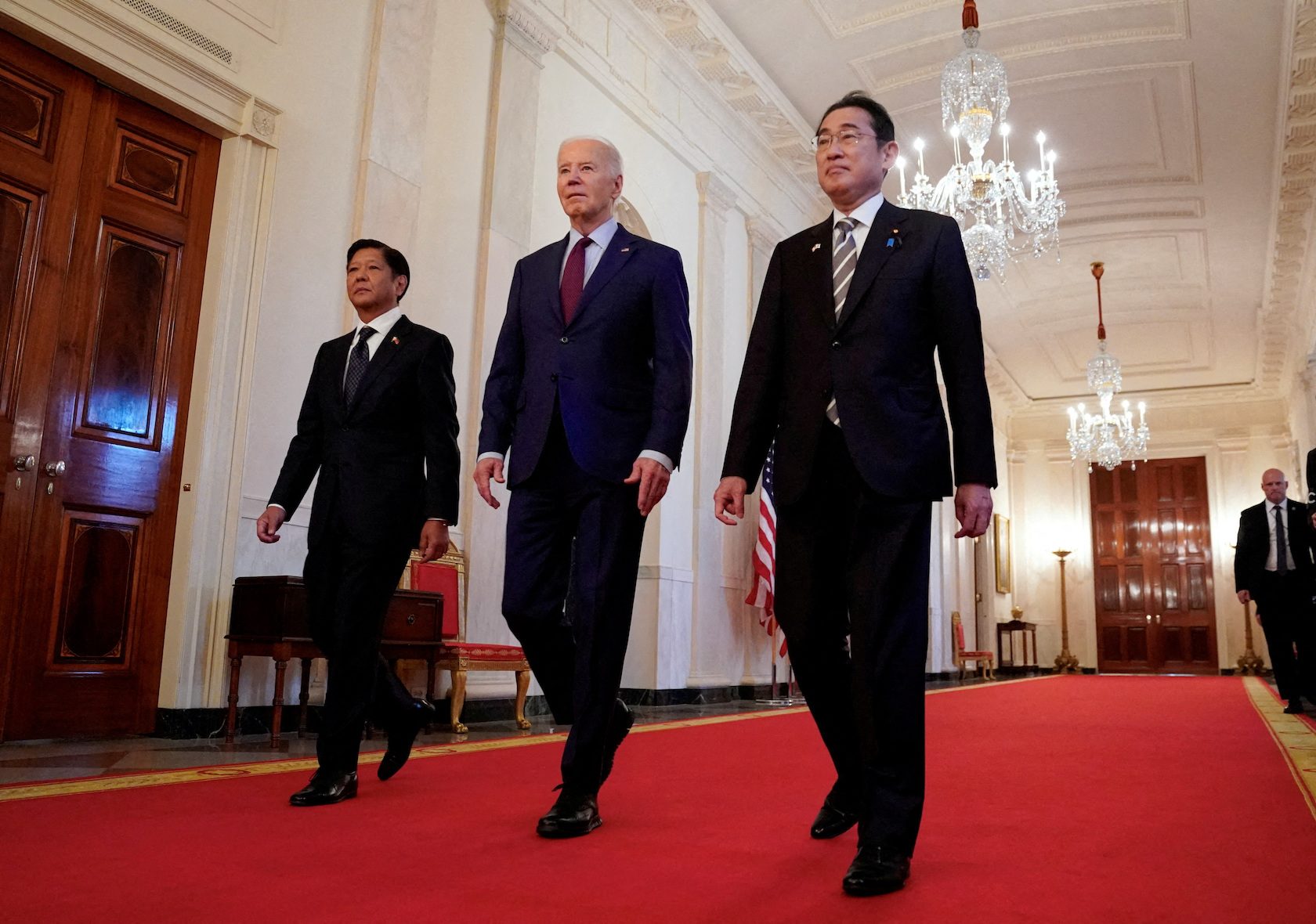
MANILA, Philippines – The United States, Japan, and the Philippines expressed “serious concern” over China’s actions in the South China Sea and the East China Sea in a In a joint vision statement on Friday, April 12 (April 11 in Washington).
The statement followed the historic leaders’ trilateral meeting between US President Joe Biden, Japanese Prime Minister Kishida Fumio, and Philippine President Ferdinand Marcos Jr. in Washington, after Kishida’s state visit to the US. Biden had a separate meeting with Marcos before the trilateral summit.
The South China Sea divides the Philippines and Chinese mainland, while the East China Sea is located between Japan and China.
The two bodies of water have been the setting of China’s growing aggressive maritime actions. In the West Philippine Sea, or part of the South China Sea within the Philippines’ exclusive economic zone, China has repeatedly harassed Philippine vessels – from government ships to the wooden boats of Filipino fisherfolk.
The US, Japan, and the Philippines called out China’s “dangerous and aggressive behavior” in the South China Sea. (ANALYSIS: The more complicated dispute in the world)
“We are also concerned by the militarization of reclaimed features and unlawful maritime claims in the South China Sea. We steadfastly oppose the dangerous and coercive use of Coast Guard and maritime militia vessels in the South China Sea, as well as efforts to disrupt other countries’ offshore resource exploitation,” the three leaders said in the joint statement.
China has also been sending government ships to waters off Senkaku Islands, and making incursions into Japan’s territorial waters.
“We express our serious concerns regarding the situation in the East China Sea, and reiterate our strong opposition to any attempts by the PRC to unilaterally change the status quo by force or coercion in the East China Sea, including through actions that seek to undermine Japan’s longstanding and peaceful administration of the Senkaku Islands,” the statement read.
The three countries announced the creation of a “trilateral maritime dialogue” that would “enhance coordination and collective responses to promote maritime cooperation.” The coast guards of the three countries are set to embark on another joint exercise, as well as a joint Indo-Pacific patrol in 2024.
“We are concerned about illegal, unreported, and unregulated fishing. We support the ability of Filipino and Japanese fisherfolk to pursue their traditional livelihoods,” the leaders said.
“To build regional capacity and address threats posed by transnational crime, illegal, unreported, and unregulated fishing, and other maritime challenges, Japan, the Philippines, and the United States plan to expand our efforts to provide maritime law enforcement training and support to partner countries in the region,” they added in their joint statement.
Trilateral ties
Maritime security and peace in the Indo-Pacific was the major theme of the first-ever trilateral leaders’ summit in the White House. Both the Philippines and Japan are treaty-allies of the US, relationships that Biden affirmed in the joint statement.
“Today, President Biden reaffirms the ironclad US alliance commitments to both Japan and the Philippines, which have helped safeguard peace and security in the Indo-Pacific for decades,” read the statement.
Marcos, speaking at the beginning of the summit, described the trilateral cooperation as the “natural progression of a deepening relations and robust cooperation amongst our three nations.”
Ties between the Philippines and the US have been on “hyperdrive” under Marcos, after the Duterte administration’s pivot to China and away from its traditional allies like the US. Japan-Philippine ties have also increased steadily through the years, with Manila being the first recipient of Tokyo’s Official Security Assistance.
Both Tokyo and Washington have called on Beijing to respect the “final and legally binding” 2016 arbitral ruling, which affirmed that Ayungin Shoal or Second Thomas Shoal is within the Philippines’ exclusive economic zone. Beijing has insisted that this ruling is invalid.
US, Japan, and Philippine leaders also emphasized the “importance of peace and stability across the Taiwan Strait as an indispensable element of global security and prosperity” as it called on a “peaceful resolution of cross-Strait issues.” Beijing has insisted that reunification with democratically-governed Taiwan was inevitable, sparking concerns that it would resort to force. – Rappler.com
ALSO ON RAPPLER
- [EXPLAINER] South China Sea: Why are China and Philippines tensions heating up?
- [OPINION] Expectations for Philippines-US-Japan trilateral cooperation: A view from Japan
- [ANALYSIS] If China thinks its title is strong, then submit to arbitration
- Foreign governments stand with Philippines after latest incident in Ayungin Shoal
Add a comment
How does this make you feel?





![[In This Economy] Marcos’ POGO ban is popular, but will it work?](https://www.rappler.com/tachyon/2024/07/thought-leaders-marcos-pogo-ban.jpg?resize=257%2C257&crop=255px%2C0px%2C720px%2C720px)
![[Rappler Investigates] POGOs no-go as Typhoon Carina exits](https://www.rappler.com/tachyon/2024/07/newsletter-graphics-carina-pogo.jpg?resize=257%2C257&crop=424px%2C0px%2C1080px%2C1080px)



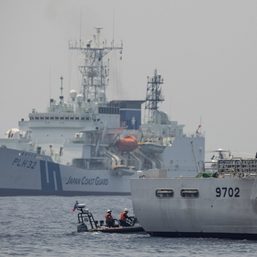
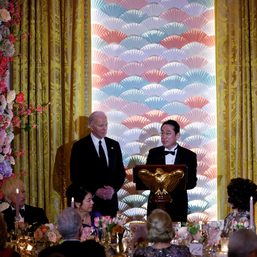
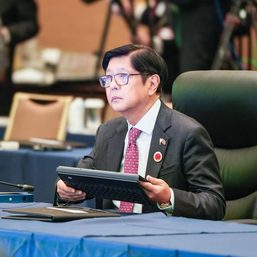


![[Hindi ito Marites] Japan: From enemy to bestie](https://www.rappler.com/tachyon/2024/07/Hindi-ito-Marites-TC-ls-7.jpg?resize=257%2C257&crop=415px%2C0px%2C1080px%2C1080px)


![[Rappler’s Best] America](https://www.rappler.com/tachyon/2024/07/rapplers-best-america.jpg?resize=257%2C257&crop=458px%2C0px%2C1080px%2C1080px)




![[Rappler’s Best] Knowing when to leave](https://www.rappler.com/tachyon/2024/07/biden-sara-gfx.jpg?resize=257%2C257&crop_strategy=attention)














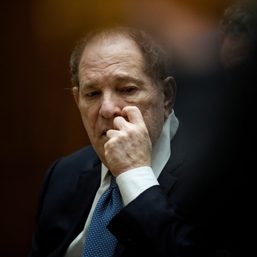





There are no comments yet. Add your comment to start the conversation.